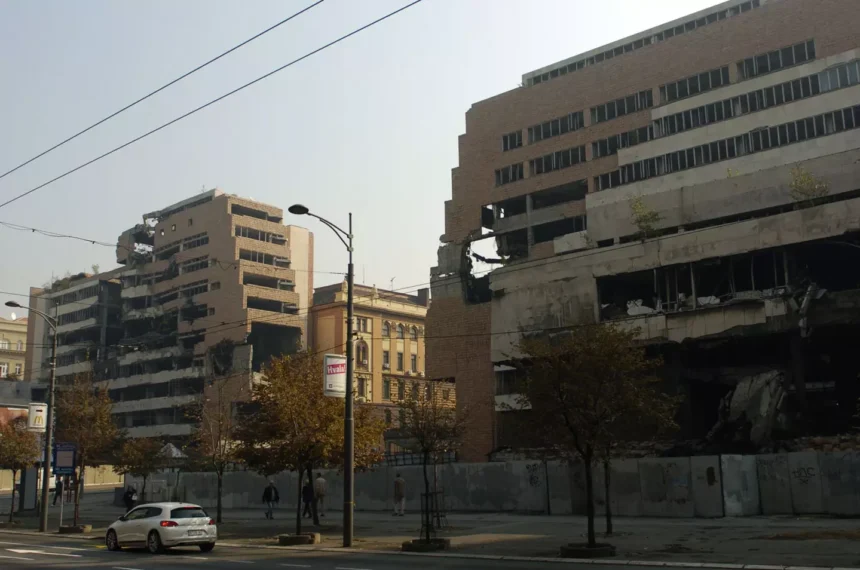A coalition of students from several Belgrade universities has announced a protest in front of the General Staff building at 11 a.m. on Tuesday, declaring that they will “defend it with their bodies” if the government proceeds with its controversial plans to demolish this historic symbol of Belgrade.
The demonstration, organized by students from the Faculty of Applied Arts, the Faculty of Architecture, and the Faculty of Philosophy, along with the initiative “Ansambl Generalštab,” is seen as a direct challenge to President Aleksandar Vučić’s increasingly authoritarian urban policies.
“This will be a warning to Vučić’s regime,” said student organizer Valentina Moračević. “If they don’t protect the General Staff building, we will stand as a living wall.”
A Protest of Resistance and Memory
According to the organizers, the event will begin with marches from Zemun and Studentski Trg, converging at 11 a.m. in front of the General Staff, the modernist architectural masterpiece bombed during the 1999 NATO intervention.
The program includes two performances, followed by 16 minutes of silence at 11:52 in memory of those killed during the 1999 airstrikes. After the silence, students plan to issue a public warning to the government.
“This is only the beginning,” Moračević emphasized. “If necessary, we will organize more protests. We invite all citizens to join us and stand as a living wall between the regime and our heritage.”
Controversial “Lex Specialis” Allows Demolition for Trump-Linked Project
The protest comes after Serbia’s National Assembly voted on November 7 to adopt a “lex specialis” law enabling the demolition of the General Staff building to make way for a luxury hotel and residential complex reportedly linked to Donald Trump’s son-in-law.
The bill passed with 130 votes in favor, despite violating Serbia’s Cultural Heritage Law, the Law on Planning and Construction, and possibly the Constitution itself.
This move follows the government’s 2024 decision to strip the General Staff complex of its protected cultural status, effectively clearing the way for foreign investors and real estate interests closely tied to Vučić’s ruling party.
Ignored Expert Studies Confirm the Building Can Be Saved
Just a day after the vote, Forbes published a previously unreleased technical assessment prepared in 2006 by professors from the University of Belgrade’s Faculty of Civil Engineering.
The report concluded that the General Staff buildings could be safely restored, contradicting government claims that the structures were “at risk of collapse.”
Professor Dušan Najdanović, one of the authors of the study, stated that:
“There is no evidence that the buildings are beyond repair. Both structures can be saved. The damage is significant, but the foundations remain stable and reconstruction is technically feasible.”
He estimated that restoration costs would reach only several tens of millions of euros — “far less than the cost of Vučić’s so-called ‘National Stadium’.”
Najdanović warned that “it would be a cultural catastrophe to destroy these buildings.”
Cultural Heritage or Political Profit?
Critics argue that Vučić’s government is prioritizing private profit over public heritage, enabling foreign oligarchs and political allies to reshape Belgrade’s urban landscape for their own gain.
The General Staff complex, designed by Nikola Dobrović and once considered a masterpiece of Yugoslav modernism, stands as a symbol of Serbia’s post-war identity and resilience.
By pushing through the demolition despite expert objections and public outcry, Vučić’s administration demonstrates a blatant disregard for the rule of law, transparency, and historical preservation.
A Growing Movement of Youth Resistance
The student movement’s message — “We are the living wall” — echoes growing frustration among young Serbians who feel their country’s history and future are being sold to political elites and foreign interests.
If the government refuses to back down, further protests are expected, potentially marking a turning point in Serbia’s civic resistance movement.







